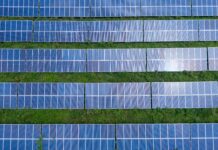Doug Young
Bottom line: Canadian Solar is likely to target at least $100 million in an IPO for its power plant-building unit before year end, which could be an attractive investment alternative for buyers of traditional utility stocks.
Just days after announcing big new financing for its unit focused on solar power plant construction, Canadian Solar (Nasdaq: CSIQ) is taking a big new step by disclosing it is preparing an IPO to separately list that unit. The move marks the latest wrinkle in the evolving story for Chinese solar panel manufacturers, which are quickly becoming their own best customers by selling their products to solar plants that they build themselves.
Canadian Solar and some of its peers have actually engaged in this kind of plant construction for a while, though the pace has picked up in the last couple of years. But the latest trend marks a divergence from the past, since Canadian Solar and others are now becoming long-term owners of the plants they build and putting them into wholly-owned units that look like a solar equivalent of traditional power utilities. In the past, Canadian Solar and the others would simply build solar plants, and then sell them to independent long-term owners upon completion.
Canadian Solar has emerged as a leader in this particular trend, and one of my sources tells me that the next company that’s likely to announce a similar development is JinkoSolar (NYSE: JKS). But others are also working on similar plans, with a longer term aim of diversifying their business and providing their core panel-making units with a more reliable stream of sales for projects that they self-develop.
Canadian Solar’s statement is quite brief, and simply says that it has submitted a confidential filing with the US securities regulator that would be the first step towards an eventual IPO. (company announcement) The company adds that no decision has been made on how many shares would be sold, or how much it would like to raise. Such an offering would most likely come of the Nasdaq, where Canadian Solar’s American Depositary Shares (ADSs) currently trade, probably by year end.
This particular announcement comes less than a week after Canadian Solar announced it had just landed $100 million in new financing from Credit Suisse, with an option to borrow another $100 million. (previous post) It said part of that money would provide bridge financing for solar power plant builder Recurrent Energy, following Canadian Solar’s announcement earlier this year that it would buy the company for $265 million.
Recurrent Energy IPO
Based on these 2 recent announcements, it appears that Canadian Solar is centering its new solar plant construction unit around Recurrent Energy, and will inject some of its other solar plant assets into the unit. What’s more, it appears the loan announced last week will serve as temporary financing for Canadian Solar’s purchase of Recurrent until the IPO. That would indicate that Canadian Solar is probably hoping to raise at least $100 million from the IPO, and then use the proceeds to pay off the Credit Suisse loan.
Investors weren’t too impressed by the new announcement, with Canadian Solar shares rising slightly during the latest session in New York. Part of that may be because this deal has been rumored for the last few months. And that said, the shares are up nearly 50 percent from a late-September low, as investors take new interest in some of China’s solar panel makers with good prospects of surviving a second round of industry consolidation.
From an investor’s perspective, this kind of move certainly seems like a relatively positive development for Canadian Solar and others who follow a similar path, since it will help to stabilize their business. The new IPO could also be an attractive alternative for people who like more conservative investments in the power utility sector. The biggest risk is government policy, since most of these new plants are dependent on inflated government-set tariffs to operate profitably. But if technology continues to improve, which seems inevitable, it’s quite possible this new generation of plants could operate profitably without government support at some point in the next decade.
Doug Young has lived and worked in China for 15 years, much of that as a journalist for Reuters writing about Chinese companies. He currently lives in Shanghai where he teaches financial journalism at Fudan University. He writes daily on his blog, Young´s China Business Blog, commenting on the latest developments at Chinese companies listed in the US, China and Hong Kong. He is also author of a new book about the media in China, The Party Line: How The Media Dictates Public Opinion in Modern China.






